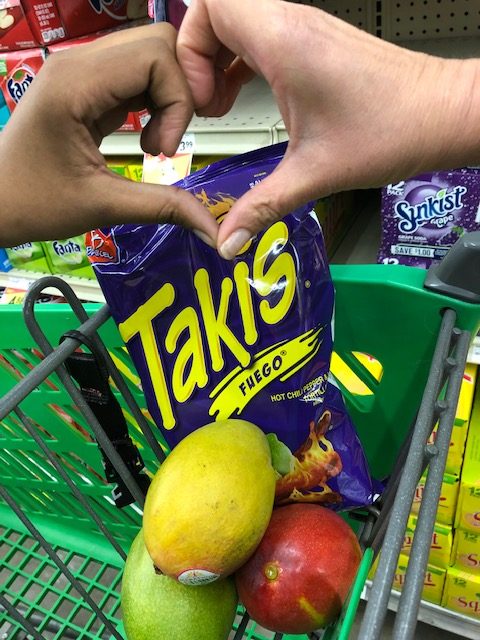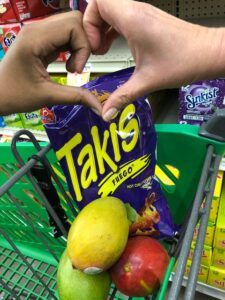
“Are you eating?” Ann, the nurse practitioner, stood a few feet away, clipboard in hand. “You’ve only gained one pound since your last visit and that’s not enough to support the baby’s growth and development.”
Nina* continued to look down, slipping her Nike slides off and on as her feet swung back and forth hitting the exam table. Silence. Slowly, she peered up and shrugged. Sixteen years old and 26 weeks pregnant, her casual outfit of yoga pants, a t-shirt and two different color socks stood in stark contrast against the royal blue and purple wrap she wore so elegantly on her head. Still like a child in so many ways, yet incredibly close to becoming a mother, Nina’s life and that of her baby stood in delicate balance.
Ann probed a little deeper. “Are things better at home? Do you feel safe?” Nina looked at me and then back to Ann, “Yea, it’s okay,” she muttered. Her body language left us guessing but she was clearly not tolerating more questions.
 Child protective services had removed her from the home of her aunt and uncle during early pregnancy, reportedly due to food shaming. The accusations were not significant enough to warrant an investigation, but after Nina returned home from a brief stay at a maternity home, she was still only eating once or twice a day. I wasn’t sure whether Ann was aware that I knew the story, so from my corner of the exam room, I cautiously spoke up. “Maybe today when we leave, we could go get some groceries for you?” The offer came in the form of a question, in hopes of building trust.
Child protective services had removed her from the home of her aunt and uncle during early pregnancy, reportedly due to food shaming. The accusations were not significant enough to warrant an investigation, but after Nina returned home from a brief stay at a maternity home, she was still only eating once or twice a day. I wasn’t sure whether Ann was aware that I knew the story, so from my corner of the exam room, I cautiously spoke up. “Maybe today when we leave, we could go get some groceries for you?” The offer came in the form of a question, in hopes of building trust.
I envisioned teaching her about all the things she should be eating, like healthy fats, adequate protein, and abundant fruits and veggies. When I shared my idea, Ann turned to me and said in her tender yet corrective manner, “She just needs calories. I don’t care what she eats. Calories and plenty of water.” She turned back to face Nina, “Limit the caffeine and sugar, but you will have to eat five or six times a day.”
Ann wrapped up the conversation with warnings of neural tube defects and the threat of “really nasty shakes” she would have to drink if she didn’t eat better.
Moments after leaving the clinic, we arrived at Nina’s favorite grocery store, Fiesta. I grabbed the cart and said, “Okay, sweet girl, I will meet you in the middle. Draw an imaginary line half way down the cart. I will buy you one healthy thing for every not so healthy thing you want.” Playfully, she grabbed the cart and took off driving, “Oh so this is how this is going to go, Ms. Rene!” she said, giggling. This banter had become a beautiful part of our friendship.
I watched as she filled the cart with mangos, avocados, bananas and yogurt, as well as giant cookies from the bakery, cookies from the shelf, ice cream, and Takis (which I’m not sure as qualify as food). While she shopped, I continued to process what the nurse practitioner had said. For this baby to be healthy and thrive, Nina needed to eat. Not what I thought she should have or what I thought was best for her. I could encourage some good choices, but I had to give her grace and freedom. Allowing her to pick the things she loved rather than only having access to what was served at home or the school cafeteria proved to be the key in supporting weight gain during her pregnancy. From that day on, every time we were together, we would go to the grocery store and repeat our shopping adventure, followed by a meal together at Regio’s. Our friendship continued to grow, and so did the baby boy in her womb.
At the next visit, Nina had gained five pounds. The one after that, seven. As her body changed, she needed our support to understand that she was not getting fat, but providing life giving nutrition to her baby. Although the nurses and volunteers working with Nina helped her in several ways, she also helped us. We learned many lessons from our first non-residential client. Our mission at Amira’s House is to serve our young girls from a place of abundant grace, but the ways in which that will surface will be as unique as each client. With Nina, it was not our place to judge her food choices or over correct them–we were there to offer guidance and support, stay teachable, and walk alongside her as she filled her cart with Takis and mangoes.
*Not her real name


